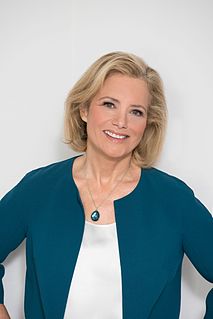A Quote by Sandra Scarr
Ideas about mothers have swung historically with the roles of women. When women were needed to work the fields or shops, experts claimed that children didn't need them much. Mothers, who might be too soft and sentimental, could even be bad for children's character development. But when men left home during the Industrial Revolution to work elsewhere, women were "needed" at home. The cult of domesticity and motherhood became a virtue that kept women in their place.
Quote Topics
About
Bad
Became
Character
Character Development
Children
Claimed
Could
Cult
Development
Domesticity
Elsewhere
Even
Experts
Fields
Historically
Home
Ideas
Industrial
Industrial Revolution
Kept
Left
Men
Might
Motherhood
Mothers
Much
Need
Needed
Place
Revolution
Roles
Sentimental
Shops
Soft
Them
Too
Virtue
Were
Women
Work
Related Quotes
Women are only half responsible for children. Men raise children as much as women do. Until men are as nurturing as women are, and until women are as active outside the home as men are, we won't have democratic families, and therefore we won't have democracy, and we will continue this hierarchical notion of life.
Most women without children spend much more time than men on housework; with children, they devote more time to both housework andchild care. Just as there is a wage gap between men and women in the workplace, there is a "leisure gap" between them at home. Most women work one shift at the office or factory and a "second shift" at home.
Even today . . . experts, usually male, tell women how to be mothers and warn them that they should not have children if they have any intention of leaving their side in their early years. . . . Children don't need parents' full-time attendance or attention at any stage of their development. Many people will help take care of their needs, depending on who their parents are and how they chose to fulfill their roles.
What if not just women, but both men and women, worked smart, more flexible schedules? What if the workplace itself was more fluid than the rigid and narrow ladder to success of the ideal worker? And what if both men and women became responsible for raising children and managing the home, sharing work, love, and play? Could everyone then live whole lives?
I'm not saying that all women are blameless - all women are not. There are women with despicable characters who are cruel and terrible and some of them are mothers. But why do we blame our mothers more than our fathers? We let our fathers get away scot-free. We hardly even knew who they were in many cases, given the way this culture raises kids, and they may have been quite cruel. They may even have raped us as children, but even if they raped us, we will blame our mothers for not protecting us instead of blaming our fathers who actually did it.
Usually women are the lynchpins of the family. They carry the brunt of the work at home and of being mothers and of taking care of the children. Not always. I have a wonderful husband, who is a great father and has helped tremendously at home. And I think that men are getting in touch and I think that the role that they have is so important, to be a good father and have a good career and be a good husband. But I think that as more and more women go into the workforce, you have to have more help at home and it becomes more of a sharing of responsibilities.
Women are an enslaved population - the crop we harvest is children, the fields we work are houses. Women are forced into committing sexual acts with men that violate integrity because the universal religion - contempt for women - has as its first commandment that women exist purely as sexual fodder for men.
The time-use studies also show that employed women spend as much time as nonworking women in direct interactions with their children. Employed mothers spend as much time as those at home reading to and playing with their young children, although they do not, of course, spend as much time simply in the same room or house with the children.
I specially want to have young women not to wait as I did until my children were grown, but young women to come in to gain their seniority so they could be respected leaders at a much earlier age. It's important for all women to see young women who share their experience whether it's as a working mom with young children, who understands the struggle and the aspirations of young women in a similar situation. And if they don't have family and they're pursuing their career women should see that as well.
I don't think that there's a target audience at all. These stories were in circulation. The stories were told by men, told in the marketplace by men, but also behind doors by women, but there's no real record of this. It's likely they were told by women to children in their interior rooms. The story could be a negative story, they could be presented as a, "Watch out! Women will get round you, do things to you, weave you in their toils." It could be buried in it an old cautionary story about women and their wiles.






























